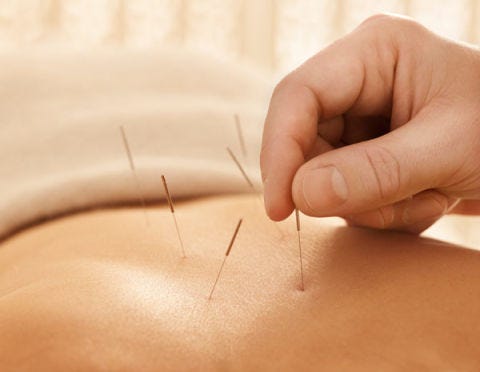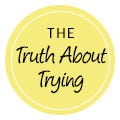
When I found out my new health insurance covered twenty-five sessions of acupuncture treatments in a calendar year, I thought to myself, why not try it? I've always been curious about the benefits from this "alternative" form of healthcare. When posting on Facebook months ago that I was going to give acupuncture a go, it received multiple comments containing success stories in treating injuries that were otherwise considered unfixable and relief from all sorts of ailments including kidney stones, allergies, migraines, and chronic lower back pain.
I didn't have a targeted purpose for trying acupuncture, although I'd be lying if I didn't admit I was curious about the possibility of "curing" my never ending tummy troubles. Outside of that, I was looking at it from a more holistic and preventative perspective. I wanted to see if going to acupuncture on a regular basis would help with my stress levels, bouts of unwelcome anxiety, and keep me from getting the common cold.
I'd like to report that although acupuncture has been experimental for me, I have found success in small things such as my TMJ (from the stress I carry in my jaw), random aches and pains (usually related to pushing it too hard in the gym) and, I'm being 100 percent honest when I tell you, that I have not been sick one day this over the entire winter.
I've developed a beautiful and nurturing relationship with my acupuncturist, Mona Chopra and believe that she always has my best interest at heart when treating me. Over the course of the past four months, and seven sessions, she's provided me various resources like alternatives to coffee drinking and research on meditation including possible locations I might want to consider in New York. She's made recommendations for teas, books, supplements, and a myriad of health related products, some of which I've adopted into my daily routine.
For me, my hour-long acupuncture sessions are a time to relax, to shut off my mind, and to be in the presence of someone I truly trust with my mind and body. When I consulted with Mona over the course of our relationship about why every busy woman should try acupuncture here are some interesting reasons that resonated most with me.
•First and foremost, prevention. This was my number one reason for trying acupuncture and although it's not the most common reason to try it, "most people try acupuncture for the first time because they have some kind of ailment be it a pain, digestive distress, emotional imbalance, or in some way feeling ‘off’ or ‘not okay.’ Acupuncture can and should be looked at like ‘preventative medicine,’ instead of waiting to get a diagnosis that you have X or Y condition," says Chopra. If you see an acupuncturist, she or he will be able to detect much more subtle imbalances in your system and work to correct them. I wholeheartedly believe that prevention is the best medicine and we, as a society, could enhance our immune systems by taking this approach, therefore being less likely to need medications and reducing the possibilities of getting sick. Preventative health is key, however you seek it—eating healthy, taking supplements, staying active, and/or acupuncture.
• Acupuncture can be used to offset stress and the effects of aging. Research proves that neglected stress can wreak havoc on our bodies and minds, leading to all kinds of ailments ranging from digestive distress, painful periods, chronic pain, hormonal imbalances, allergies, blood pressure and sugar imbalances, anxiety, depression, insomnia, and fatigue. Must I go on? Cosmetically speaking, wrinkled skin, grey hairs, thin hair, and dark circles under the eyes are no strangers to the extremely stressed body. Acupuncture has been proven to help offset these adverse effects and can help promote a more youthful energetic you—on the inside and out. Are you building a career but one day hope to have children? Join the club. Acupuncture can be a powerful modality for promoting fertility too, when the time comes!
• Acupuncture can help you understand your body and mind better. "It can help you see yourself in a whole new light," Chopra says. Acupuncture is so much more than just being stuck with tiny needles. Imagine having someone sit with you with for one full hour (or more) and listen to you express your concerns about your health and your life as a whole. Imagine that person asking key questions that no medical doctor or psychotherapist may have asked you (because it's not in their training and/or paradigm to ask). Questions that will help you better understand why you are the way you are, why your body may be acting the way it's been acting. And, in addition to being treated with acupuncture to help regulate your system, also offering suggestions for your diet and lifestyle that may help you make the changes you want to see in your life.
The next time you have trouble sleeping, difficulty concentrating, have paid the doctor a visit only to receive a 'clean bill of health' but know that something else is lurking underneath the surface, consider acupuncture. Your acupuncturist may be able to detect more subtle imbalances that could be leading to those distressing symptoms.
Furthermore, acupuncturists are trained to treat not only the “symptoms” but the “root causes,” which means making changes on deep fundamental levels of your being. If you have ever had the thought, "I've always been like this" or "I'm just an anxious kind of person," an acupuncturist can not only help you understand how these constitutional tendencies or learned habits are thought of in Chinese medicine, she or he can also help you to see how unblocking certain channels or nourishing others may help to free you from those ways of being.
Signing Off Glad I Tried Acupuncture,
Renee
Mona Chopra, MA, MS, is a New York state licensed and nationally board certified (NCCAOM) acupuncturist with over a decade of experience in mind-body medicine. Mona is also a therapeutic yoga instructor, a certified hypnotist and a childbirth doula. Mona enjoys treating people of all ages and walks of life, and is committed to finding ways of making acupuncture and holistic medicine accessible to more and more people. After all these years, Mona continues to be awe-inspired by the immense potential of the human body and spirit to heal. For more information or to schedule an appointment, call: 917.834.2124 or email: mona@peopletreewellness.com. More information about Mona Chopra, L.Ac., and about acupuncture visit www.peopletreewellness.com.
Original article and pictures take www.shape.com site


